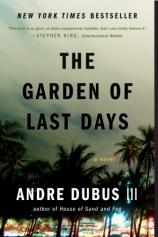The Garden of Last Days
Review
The Garden of Last Days
THE GARDEN OF LAST DAYS is one novel that gives the lie to the notion that character-driven literary fiction can’t be hitched to a propulsive plot. Richly imagined and profoundly atmospheric, it carves out a slice from the netherworld of modern American life that’s both stark and compassionate.
Set on Florida’s Gulf Coast, much of the novel's action takes place in the seedy Puma Club for Men, where a dancer and single mother by the name of April has brought her three-year-old daughter Franny one evening in early September 2001. Jean Hanson, an elderly Midwestern widow who is April’s landlord and the child’s babysitter, is ill and April can’t afford to sacrifice the several hundred dollars in cash she’ll earn dancing on this night. Instead, she deposits Franny, her pajamas and a stack of Disney videos with Tina, the club’s ironically titled “house mom,” who is responsible for supervising the dancers. Not surprisingly, Tina’s care is less than attentive, and when the child wanders outside, she encounters AJ Carey, a patron who has been ejected for touching one of the dancers, both his spirit and his wrist broken in the process.
AJ is one of several tormented characters in a novel that is redolent of the apocalypse, as its title implies. Barred from his own house by a court order after he strikes his wife, he aches to be with his own young son. Of all the novel’s characters, he’s the one with the most compelling vision of an idealized life, one he’s utterly unequipped to attain. In the parking lot he sees the abandoned Franny, who becomes a surrogate for his son, and the impulsive decision he makes kicks the novel’s plot into high gear.
Throughout the evening, April (or “Spring,” as she’s known to the patrons of the Puma Club) dances in the Champagne Room at a cost of $500 an hour for a small, Middle Eastern young man with a tense demeanor and the “smell of onions and cigarettes on his breath.” Bassam al-Jizani is a native of Saudi Arabia and one of the hijackers who is shortly to depart for Boston to meet his destiny and fundamentally change the course of American history. Throughout the novel’s first 200 pages, Andre Dubus III brilliantly weaves glimpses of the frank encounter between Bassam, who calls himself “Mike” --- utterly contemptuous of the Puma Club’s patrons, “largely asleep in the evil they do” --- and April, who tells herself she’ll only remain in that life “till I didn’t have to anymore.”
Dubus exercises an impressive degree of narrative control to give the novel its unrelenting pace. Although the entire story is told from a third person point of view, he offers the perspectives of eight different characters, skillfully shifting his lens from one to another to heighten and sustain maximum tension. Over the course of its 533 pages, these perspectives change constantly, sometimes in as few as two pages, focusing our vision intensely on the next dramatic turn in the story’s headlong rush.
As he did in HOUSE OF SAND AND FOG, Dubus excels at creating a vivid cast of characters driven by powerful and conflicting desires. On the surface, few of them appear even remotely sympathetic. We feel like bystanders at a terrible automobile accident, appalled by the carnage and yet so riveted by the drama we’re compelled, against our instincts, to watch. But in the end, as Jean Hanson puts it, “we’re made to look their fate in the eye squarely and with clarity, devoid of manufactured hopes and surface lies.”
It would be misleading to suggest that THE GARDEN OF LAST DAYS is a 9/11 novel in the sense of ones like Don DeLillo’s FALLING MAN or Jonathan Safran Foer’s EXTREMELY LOUD AND INCREDIBLY CLOSE. The events of that terrible day are discussed only obliquely in the book’s final pages. Without diminishing them in any way, Dubus is content to treat them as a faint echo of the turmoil in the lives of these characters that precede them.
If they had lived, this is the novel that Raymond Carver, or perhaps Dubus’s father Andre, the brilliant short story writer and essayist, would have written. We’re fortunate that it has fallen to the hands of a writer as gifted as Andre Dubus III to tell this disturbing and yet ultimately redemptive tale.
Reviewed by Harvey Freedenberg on April 27, 2011
The Garden of Last Days
- Publication Date: June 1, 2009
- Genres: Fiction
- Paperback: 544 pages
- Publisher: W. W. Norton & Company
- ISBN-10: 0393335305
- ISBN-13: 9780393335309





